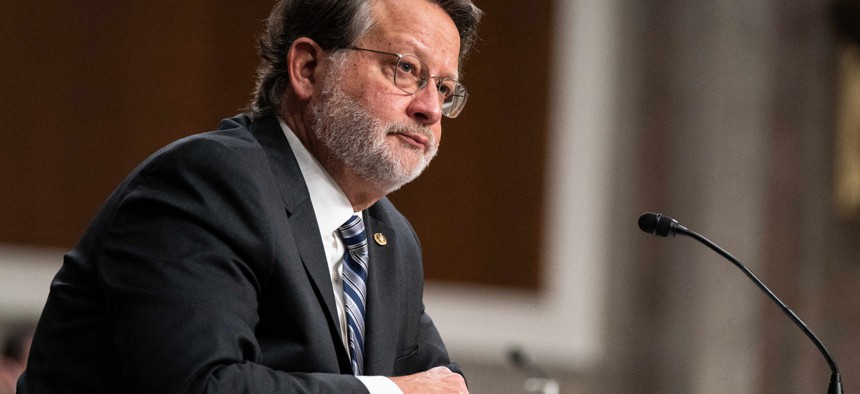CISA's public-private cyber defense group helped speed Log4j mitigation, experts say

Sen. Gary Peters (D-Mich.) at a Senate hearing, March 25, 2021 Andrew Harnik/AFP via Getty Images
A panel of cybersecurity pros testified that the Cybersecurity and Infrastructure Security Agency's collaborative operational body helped speed up response times and provide critical real-time insights on the Log4J software vulnerabilities to a vast range of companies and federal agencies.
The Joint Cyber Defense Collaborative (JCDC) helped both major businesses and underfunded organizations respond to the Log4j software vulnerability after it was discovered late last year with real-time guidance and enhanced information sharing methods, a panel of cyber experts testified at a congressional hearing on Tuesday.
The Cybersecurity and Infrastructure Security Agency (CISA) launched the JCDC in August 2021, establishing a collaborative operational body of federal officials and key industry players to develop whole-of-nation cyber defense plans and share insights on major vulnerabilities and cyber incidents.
When the software flaw was first identified by a cloud security team at Chinese e-commerce firm Alibaba in November, the JCDC guided companies in determining where to distribute their cyber resources while working to patch known vulnerabilities, according to Brad Arkin, senior vice president and chief security and trust officer of Cisco Systems, who testified at a Feb. 8 hearing of the Senate Homeland Security and Government Affairs Committee.
"Cisco was able to respond significantly faster and was able to identify the use of the Log4j library within its products and services and provide software patches for affected products within 10 days," Arkin said, later adding: "The information that we got through the JCDC helped us to understand the techniques and attacks that were being observed in the real world, so that we could then marshal our resources in defense of that."
CISA Director Jen Easterly announced the formation of the JCDC, a recommendation of the Cyberspace Solarium Commission, during last year's Black Hat cybersecurity conference. Easterly said the collaborative group would allow the federal government and its partners to be "proactive versus reactive in our collective approach to dealing with the most serious cyber threats to our nation." In standing up the group, CISA partnered with the Department of Defense, U.S. Cyber Command, the National Security Agency and more, as well as industry partners including Google Cloud, Lumen, Microsoft, Palo Alto Networks, and Verizon.
Palo Alto's deputy director of threat intelligence Jen Miller-Osborn also attributed faster response times across industries on the Log4J vulnerability to the JCDC and its engagement with the private sector.
"The most recent JCDC engagement, which occurred after [the flaw] was first discovered, presents an important use case of the long-term opportunity this collaboration vehicle presents," Miller-Osborn said, adding that the JCDC can serve as "a clearinghouse for giving effective guidance geared towards these mid-to-lower-sized businesses."
Committee Chairman Sen. Gary Peters (D-Mich.) stressed the need for increased information sharing and cyber reporting requirements in response to the Log4j software flaw and international cyber threats seen in recent weeks, including a recent Russian-linked cyber attack targeting government websites in Ukraine.
During the hearing, the senator announced he was reintroducing three cybersecurity initiatives that were left out of last year's defense authorization bill. The committee later unveiled an omnibus cybersecurity bill featuring mandatory cybersecurity incident reporting legislation for civilian agencies and critical infrastructure companies, as well as updates to the Federal Information Security Management Act (FISMA) and the Federal Risk and Authorization Management Program (FedRAMP).
"This legislation will help our lead cybersecurity agency better understand the scope of attacks, including from vulnerabilities like Log4j, to warn others of the threat, prepare for potential impacts, and help affected entities respond and recover," Sen. Peters said. "And, by modernizing the government's cybersecurity posture by passing FISMA reforms, we can help prevent online assaults against federal agencies, from foreign and domestic actors who seek to degrade our national and economic security."



